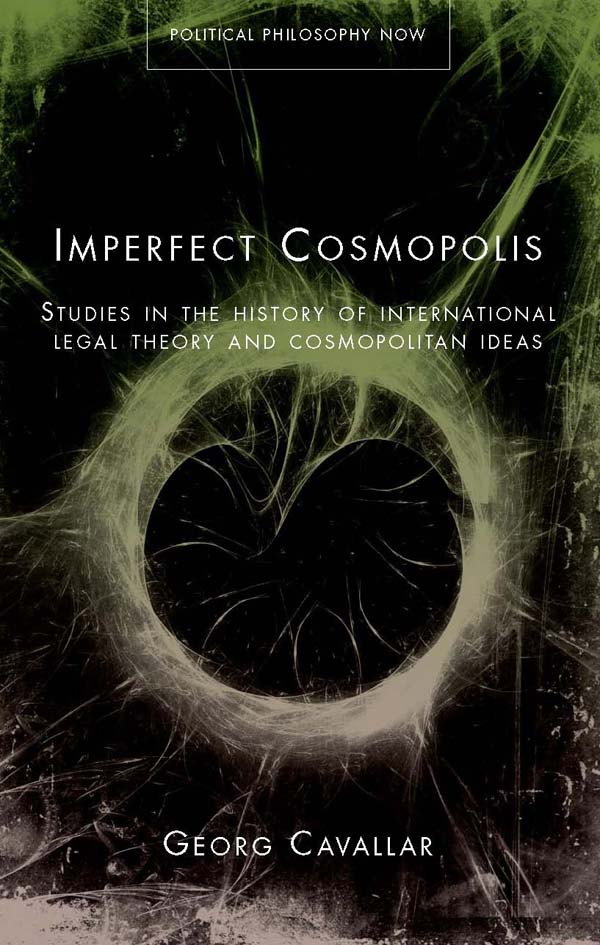Imperfect Cosmopolis
Studies in the History of International Legal Theory and Cosmopolitan Ideas
Author(s) Georg Cavallar
Language: English
Genre(s): Politics
Series: Political Philosophy Now
- April 2011 · 240 pages ·216x138mm
- · Hardback - 9780708323670
- · eBook - pdf - 9780708323687
- · Paperback - 9780708323823
- · eBook - epub - 9781783164592
In current debates, the term cosmopolitanismA" often remains quite vague and leads to sweeping generalizations. Unlike many recent publications, this book looks at the notion from a decidedly historical perspective, trying to give depth and texture to the concept.
Der Verfasser ist Lehrer am Bundesgymnasium Wien 9 und Lehrbeauftragter am Institut fur Philosophie in der Lehrerbildung und Lehrerinnenbildung und im Europalehrgang der Universitat Wien. Er ist insbesondere philosophisch ausgewiesen und hat etwa 1992 unter dem Titel Pax Kantiana eine systematisch-historische Untersuchung des Entwurfs A Zum ewigen Frieden" (1795) von Immanuel Kant und 2002 ein Werk mit dem Titel The Rights of Strangers. Theories of international hospitality, the global community and political justice since Vitoria. Ashgate, Aldershot 2002. VIII, 421 S. vorgelegt. Dem folgte 2006 eine Untersuchung der Europaischen Union als einem Wegstuck von der Utopie zur Friedens- und Wertegemeinschaft. Sein neues, ebenfalls englisch verfasstes und in England verlegtes Werk befasst sich mit der unvollkommenen Natur kosmopolitischer Uberlegungen ausgewahlter Verfasser in der europaischen Geschichte der fruhen Neuzeit. Nach einer kurzen Einleitung beginnt es mit Vitoria, Grotius, Pufendorf, Wolff und Vattel, denen gegenuber der Verfasser die Frage stellt, ob sie geistige Teilnehmer der europaischen Kolonisierung oder wahre Anhanger kosmopolitischer Gedankengange waren. Von hier aus wendet sich der Verfasser der britischen Aufklarung zu, die er als Sieg kommerzieller Bestrebungen einordnet. Kant sieht er demgegenuber als Vertreter vertraglicher Vorstellungen an. Bereits fur das Ende des 18. Jahrhunderts ermittelt er die Idee einer Einheit Europa. Eine weltweite Gemeinschaft findet er dabei in Werken Pufendorfs, Vattels, Bluntschlis und Verdross'. Am Ende bietet er Schlussfolgerungen, FuA noten, eine Bibliographie und einen Index, wahrend eine deutsche Zusammenfassung fur die deutschsprachige Leserschaft leider nicht vorgenommen wird, weshalb man den Gedankengangen nur wunschen kann, dass sie trotz dieser kleinen Unvollkommenheit moglichst viele Leser finden wird. Innsbruck Gerhard Kobler The range of Georg Cavallar's reading into the history of legal and political thought is impressive in both its breadth and its depth. It makes Imperfect Cosmopolis a richly textured account of the formation of European cosmopolitan ideas that enlightens us to how varied and also how imperfect cosmopolitan visions have been. In providing us with this more nuanced account, Cavallar presents the cosmopolitan project itself in a more humble, and therefore somehow more attractive, light.' Gideon Baker B Arts (Hons), M Arts, PhD, Senior Lecturer, Griffith Business School, Griffith University
*Introduction *Vitoria, Grotius, Pufendorf, Wolff and Vattel: accomplices of European colonialism and exploitation, or true cosmopolitans? *British Enlightenment: the triumph of commercial cosmopolitanism *Kant and the 'miserable comforters': contractual cosmopolitanism *Late eighteenth-century international legal theory: from cosmopolis to the idea of Europe *Immigration, rights and the global community: Pufendorf, Vattel, Bluntschli and Verdross *Conclusion


